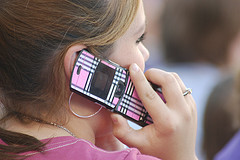 Mike Nizza, author of the New York Times blog The Lede, recently reported on a new study from physicist Cesar Hidalgo of the University of Notre Dame and Calros Rodriguez-Sickert from the Pontifical Catholic University of Chile on the persistence of relationships within the cell phone network.
Mike Nizza, author of the New York Times blog The Lede, recently reported on a new study from physicist Cesar Hidalgo of the University of Notre Dame and Calros Rodriguez-Sickert from the Pontifical Catholic University of Chile on the persistence of relationships within the cell phone network.
Hidalgo and Rodriguez-Sickert used data from almost two million people and eight million phone calls over the course of the year. They found that the leading cause of a persistent relationship was reciprocity – one friend returning another’s call.
PhysOrg.com interviewed Hidalgo:
“‘One result that I thought was somehow not so intuitive was the trade-off between the degree (number of links) of a person and the persistence of its ties,’ Hidalgo told PhysOrg.com. ‘It has been known for a long time that some people are much more connected than others, yet it was not known whether these highly connected individuals also had a larger number of strong connections. While time constraints may force people with more ties to be less persistent on average, the data also showed that, in absolute terms, people with more ties also have a greater number of persistent ties than those less connected. Highly connected individuals are not trading quality for quantity; rather, they appear to be more socially expressed in both the numbers of links and the persistence or strength of them.'”

Comments 4
hapnyl — November 21, 2020
I wanted to marry a foreigner for a long time, but I could not choose a country to search for. And https://yourmailorderbride.com/brazilian-brides/ helped me to make my choice. I chose Brazil. And after a month of searching for advice from this site, I found her, my queen.
Maria — July 17, 2021
Now is the world of mobile mobile dependable! All the things we need to get done, are completely or partially involved with mobile phone devices. Relationship over the world has now become a common scene now a day. I use this https://flirtymania.com/de.html for getting connected with the world and I like their services.
Mergarette — July 19, 2021
Relationship over the internet and mobile phone has been a common scenario now a days all over the world. There are many such websites for instance this ulive.chat website you can trust for having a good relationship and conversation with popular stars including actors actresses and performers all over the world. Thanks for sharing this post with us.
MayRonda Smirnova — October 31, 2021
I agree with you and I need to call my friends back. I usually talk with them in my blog lesbian chat room but it`s far from a real conversations.